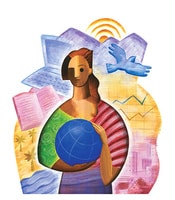This interdisciplinary course and analysis will focus on the role of women in the process of social transformation in power relations toward an egalitarian, democratic, and just society, whether as individual agents or as part of organized and group-seeking struggles (including women’s feminist movements). We will discuss the gender elements of socio-historical, technological, economic, cultural, and political developments during lectures and student research projects. That is, we will look at the impact of women’s roles and civil rights struggles on these developments, as well as the interaction of societal changes and gender roles and relationships. From a national, international, and global perspective, it examines the differences, commonalities, and challenges in the attitudes, strategies, and tactics of women’s movements that are influenced by the intersection of political geography, race, ethnicity, nationality, class, and sexual and cultural orientation. We’ll look into it. At the same time as we focus on modern Iran, we choose a few countries from various regions to perform a comparative study between Iran and these countries. Despite the fact that this course focuses on women, we will inevitably analyze women’s existence, function, and involvement in relation to other sexes, particularly men and women. Of course, our analytical perspective will not be restricted to the perceived gender divide. We hope to demonstrate the gender dimensions of social transformation through lectures and research articles that you will publish. We will explore women’s agency and social engagement not only in the formal sphere of laws and political institutions associated with the government, but also in the social, cultural, and customary non-governmental and informal spaces and institutions of people’s daily lives in this training course. At the same time, when using scientific criteria to assess progress in women’s rights, we will take into account equality of gender rights and justice on a global scale, in addition to individual, family, municipal, and national levels, as well as historical, philosophical, moral, and legal changes. That is, we will pay special attention to universal norms, ideals, values, and norms found in transnational and international conventions and legal conventions like the Universal Declaration of Human Rights and the Universal Declaration on the Elimination of All Forms of Discrimination Against Women.


